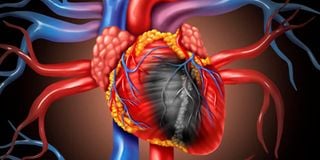Tips to help you maintain a healthy heart and stay away from heart disease

The cardiovascular system supplies blood throughout the body and is made up of the heart, arteries, veins and capillaries.
What you need to know:
- Everyone should take measures to ensure they keep a healthy heart for as long as possible.
- Knowing what changes to expect as you age and simple tips will help people of all ages achieve this goal.
- For more detailed advice on preventing heart disease according to your age group, please consult with your doctor.
The heart is responsible for pumping blood throughout the body, and delivering oxygen and nutrients to cells. Many people do not think about heart health until they are older.
Heart
The heart is a muscle about the size of your fist. It is a complex organ, and many things can go wrong. For example, the heart can become enlarged or develop a blockage.
The most common type of heart disease is coronary artery disease, which happens when arteries that supply blood to the heart become narrow and blocked. This can lead to a heart attack.
Other conditions that can affect the heart include:
- Congestive heart failure (the inability of the heart to pump enough blood)
- Arrhythmias (irregular heartbeat)
- Heart valve disease (a problem with one or more of the valves in your heart)
- Cardiomyopathy (infection of the heart muscle)
How your heart changes with age
The heart is a resilient organ and can adapt to different circumstances. Over time, the heart does change. For example, as you get older, the muscle tissue in your heart becomes less elastic and flexible. This can lead to a condition called stiff heart syndrome.
The heart may also not pump as efficiently as it did when you were younger. This can lead to congestive heart failure, which causes shortness of breath and fatigue.
Signs of heart disease
- Chest pain
- Shortness of breath
- Fatigue
- Dizziness
- Irregular heartbeat
If you experience any of these symptoms, see your doctor. Many heart problems can be treated if they are diagnosed early.
Preventing heart diseases
General healthy measures include
- Eating a healthy diet
- Exercising regularly
- Maintaining healthy weight
- Avoiding tobacco
You can also take specific measures depending on your age group.
20 and 30years
At this age, your heart is healthy, and there is not much you need to do. However, it is important to start living a healthy lifestyle to prevent heart disease in the future.
Visit the doctor for advice on your diet, exercise, and monitoring your blood pressure, cholesterol, heart rate, sugar level, and body mass index.
Avoid stressful situations. There is the pressure to succeed in your career, maintain a social life, and take care of your family. But don't forget to take time for yourself and relax.
40 to 60 years
The risk for heart disease increases as you get older.
- Eat a healthy diet
- Exercise regularly
- Avoid tobacco
- Go for regular check-ups. If you have been diagnosed with any cardiac issues, make sure you adhere to your treatment plan.
- Check if you have a family history of heart disease and share this information with your doctor
- Snoring could be a sign of obstructive sleep apnea, a condition that increases your risk for heart disease. Seek help.
Adults above 60
Heart disease is a leading cause of death for people over 60 years old. However, this does not mean you can't take steps to prevent it. Some things you can do include:
- Watch your weight and eat a healthy diet.
- Watch out for signs of heart disease and seek treatment if you experience any symptoms.
- Get regularly assessed for cholesterol, blood pressure, and diabetes.
- Take care of your mental health. Depression is a risk factor for heart disease. If you feel depressed or anxious, seek help from a doctor or therapist.




